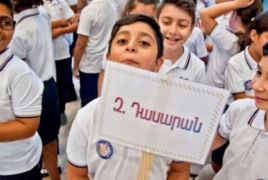
The Armenian community in Turkey is facing serious challenges in preserving its identity and cultural heritage. Although the right to education for Istanbul’s 50,000 Armenians is formally guaranteed by international treaties, it encounters numerous practical obstacles, according to Region Monitor.
There are 16 Armenian schools in Istanbul, but historical developments and recent political trends have led to their declining role and influence.
Armenian schools receive no state funding, relying solely on community foundations and private donations for survival.
According to the Hrant Dink Foundation’s latest report, 3,016 students were enrolled in Armenian schools during the 2021-2022 academic year, but by 2022-2023, this number had dropped to 2,865, marking a 5% annual decline. This decrease is partly due to Armenian students opting for Turkish schools, which better facilitate university admission. Additionally, some Turkish universities offer Armenian studies programs in Eastern Armenian, while the local community speaks Western Armenian.
Armenian schools operate under a unique status. While formally considered private institutions, they are subject to strict state control. The Turkish government appoints administrative and teaching staff, requiring Armenian schools to include Turkish deputy principals and teachers responsible for subjects like Turkish history, literature, geography, and language. These officials exercise control over school operations and can impose restrictions.
The Armenian community in Turkey is one of the country’s three officially recognized minorities.

